
The Taipei Golden Horse Film Festival and Awards is a film festival and awards ceremony held annually in Taiwan. It was founded in 1962 by the Government Information Office of the Republic of China (ROC) in Taiwan. The awards ceremony is usually held in November or December in Taipei, although the event has also been held in other locations in Taiwan in recent times.

Koo Chen-fu, also known as C.F. Koo, was a Taiwanese businessman and diplomat. He led the Koos Group of companies from 1940 until his death. As a chairman of the Straits Exchange Foundation (SEF), Koo arranged the first direct talks between Taiwan and mainland China since 1949 and served as Taiwan's negotiator in both the 1993 and 1998 Wang-Koo summit.

One-Armed Swordsman is a 1967 Hong Kong wuxia film produced by the Shaw Brothers Studio. Directed by Chang Cheh, it was the first of the new style of wuxia films emphasizing male anti-heroes, violent swordplay and heavy bloodletting. It was the first Hong Kong film to make HK$1 million at the local box office, propelling its star Jimmy Wang to super stardom.

Jimmy Wang Yu was a Taiwanese actor, film director, producer, and screenwriter. Wang rose to fame in 1967 with his starring role in One-Armed Swordsman, a martial arts film produced by the Shaw Brothers Studio, and The Chinese Boxer (1970).
Huang Yu-chun, known by her final stage name Ivy Ling Po, is a retired Hong Kong actress and Chinese opera singer. She is best known for a number of mega-hit Huangmei opera films in the 1960s, especially The Love Eterne (1963) which made her an Asian superstar overnight. She played an important role in the entertainment industry for preserving the Huangmei opera art form.

Shek Wing-cheung, better known by his stage name Shih Kien, Sek Kin, or Sek Gin or Shek Kin(Chinese: 石堅; pinyin: Shí Jiān; Jyutping: Sek6 Gin1), was a Hong Kong–based Chinese actor. Shih is best known for playing antagonists and villains in several early Hong Kong wuxia and martial arts films that dated back to the black-and-white period, and is most familiar to Western audiences for his portrayal of the primary villain, Han, in the 1973 martial arts film Enter the Dragon, which starred Bruce Lee.
Filmography for the Indo-Chinese Hong Kong film actor and martial artist Lo Lieh:

All Men Are Brothers, also known as Seven Soldiers of Kung Fu, is a 1975 Hong Kong wuxia film based on the Chinese classical 14th century novel Water Margin. The film was produced by the Shaw Brothers Studio and directed by Chang Cheh and Wu Ma.
Roy Chiao was a Hong Kong actor, most notable in the United States for playing the minor villain Lao Che in the 1984 movie Indiana Jones and the Temple of Doom.
Between Tears and Laughter is a 1964 Hong Kong drama film directed by Lo Chen. Set in Republic of China (1912–49) era Peking (Beiping), the story revolves around a college student and three young women: a wealthy daughter of a government bureaucrat, a traditional singer in a band and a street kung-fu/acrobat performer.
Sibelle Hu is a Taiwanese actress, singer and TV personality who starred in both Taiwanese and Hong Kong movies. She acted in many movies in the 1980s and 1990s and retired in the late 1990s.

A Tiananmen Journal: Republic on the Square by Feng Congde (封从德) was first published in May 2009 in Hong Kong. This book records the 1989 Tiananmen Square protests and massacre from April 15, 1989, to June 4, 1989, in detail. Author Feng Congde is one of the student leader in the protest and his day-by- day diary entries, record every activity during the protest including the start of student protests in Peking University, the activities of major student leaders, important events, and unexposed stories about student organizations and their complex decision making.

The Seven Heroes and Five Gallants is a 1994 Taiwanese television series produced by Chinese Television System (CTS) a few months after its prequel Justice Pao, which was also produced by Chao Ta-shen. Dozens of actors appeared in both series, but only Sze Yu and Tu Man-sheng reprised their roles. Fan Hung-hsuan and Lung Lung chose to portray new characters rather than their iconic roles.
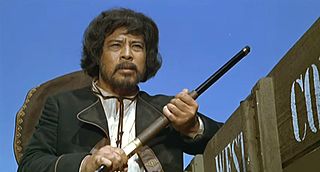
George Wang was a Taiwanese actor and producer who appeared in a multitude of Italian films.
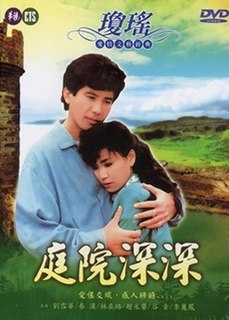
Deep Garden is a 1987 Taiwanese mystery TV drama series based on romance novelist Chiung Yao's 1969 novel. The series was produced by Chiung Yao's husband Ping Hsin-tao and first shown on Chinese Television System. The title is taken from an 11th-century poem by Ouyang Xiu, which happens to be the favorite line of the mysterious female protagonist.
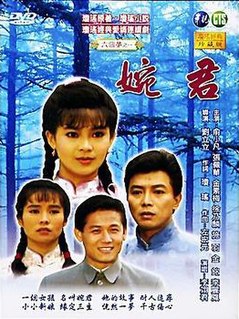
Wan-chun is a 1990 Taiwanese television series produced by Ping Hsin-tao and his company Yi Ren Communications Co. (怡人傳播公司) in conjunction with Chinese Television System, based on Chiung Yao's 1964 novellette Wan-chun's Three Loves, which is set in Republican era Beijing.
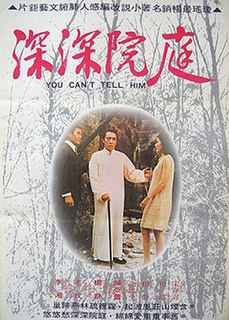
You Can't Tell Him is a 1971 Taiwanese drama film directed by Sung Tsun-shou, based on Chiung Yao's 1969 novel. The film stars Gua Ah-leh and Peter Yang.
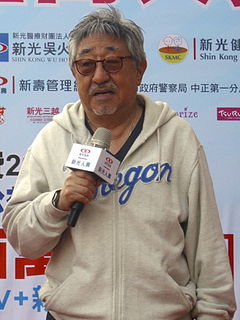
Sun Yueh was a Taiwanese actor.
Fung Hak-on was a Hong Kong actor. He appears in Hong Kong films since the 1960s until mid 2010s.













